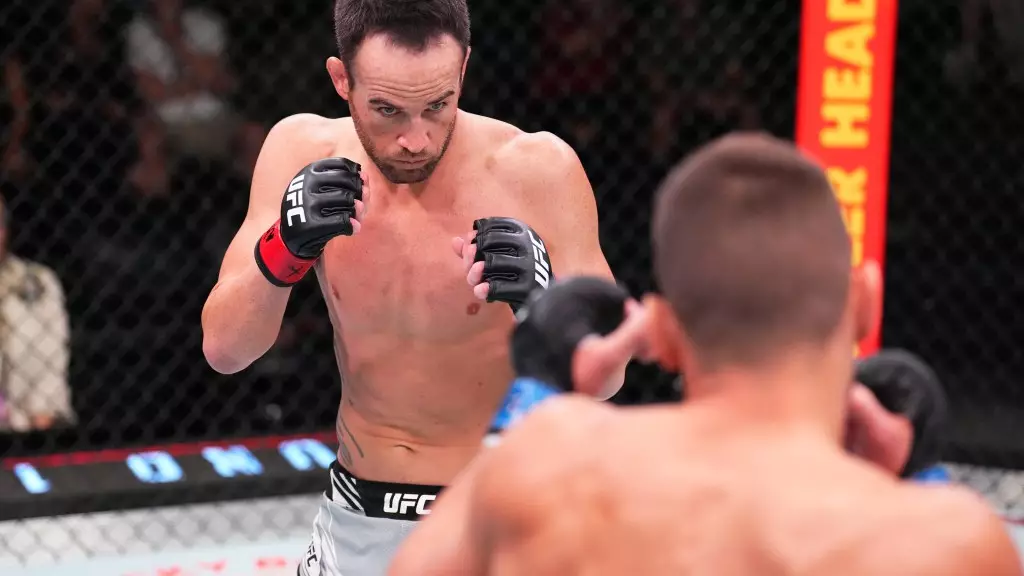The world of mixed martial arts (MMA) is replete with stories of challenges, triumphs, and, for some fighters, moments of existential reflection. Recently, Damon Jackson, a seasoned competitor in the UFC, found himself at a crossroads. After a disappointing first-round submission loss to Jim Miller at UFC 309 in November, Jackson temporarily hung up his gloves in a symbolic gesture that suggested retirement was near. However, after personal contemplation, he has decided against exiting the sport entirely. His choice to return offers a window into both the psychological and emotional complexities that athletes grapple with in the wake of defeat.
In an emotional revelation to MMA Junkie Radio shortly after the fight, Jackson expressed the myriad of feelings he experienced post-defeat. He described it as “an emotional night,” laden with a mixture of frustration and shock that stemmed from the unexpected conclusion to a fight that he had trained diligently for. Reflecting on the pressures of competition, he noted that the cumulation of personal struggles over the past few years had weighed heavily on him.
Jackson’s experience resonates with many athletes who have faced similar adversities. The feeling of disappointment isn’t merely about losing; it’s about the culmination of training, hope, and the long journey that culminates in a single moment of performance. When athletes invest so much, it’s only natural to grapple profoundly with the aftermath of a loss. In Jackson’s case, his pride in jiu-jitsu and wrestling compounded the disappointment of not performing up to his standards. This introspection raises critical questions about identity and performance for fighters: How does one balance their self-worth with the outcomes of their sport?
Jackson’s decision to postpone his return to the octagon is highlighted by his prioritization of family. Following his divorce, which he described as a significant obstacle this past year, his focus has turned to ensuring a stable and nurturing environment for his four daughters. This pivot towards family demonstrates the multidimensional nature of athletes, who often face personal battles parallel to their professional careers.
Despite his intentions to elevate his family life, Jackson hasn’t neglected his professional aspirations. He plans to utilize the upcoming months to expand his gyms while also embarking on the creation of fitness machines aimed at the public. This entrepreneurial spirit is commendable and demonstrates that athletes can explore passions beyond the confines of physical competition.
Jackson’s admission that he has been a dedicated father indicates a level of prioritization that is often overlooked in the fight community. This statement draws attention to the emotional sacrifices athletes make and the dual roles they navigate in their lives. In attempting to maintain presence in his daughters’ lives while managing the stressors of a public career, Jackson provides a refreshing perspective on being a fighter who is also a father.
At 36, Jackson knows that the clock is ticking on his fighting career. However, he insists that this isn’t the end; rather, it’s a temporary hiatus. He has emphasized that he continues rigorous training in the gym, even while stepping back. Here, Jackson’s mental state takes center stage. He has recognized the need for a pause—not as a surrender, but as a strategic retreat to reassess his approach to fighting and life.
His withdrawal from the UFC’s anti-doping testing pool adds another layer to his temporary hiatus. The implications of this decision are vital. It means he will need to undergo months of clean testing should he wish to compete again, thereby reinforcing his intention for a thoughtful, well-planned return rather than one driven by impulsive reactions to defeat.
Furthermore, Jackson’s commitment to fight only for the UFC indicates a pragmatic mindset. In the hyper-competitive landscape of MMA, where multiple organizations vie for talent, Jackson remains steadfast in his loyalty to the UFC. This loyalty is not just about contracts and fights; it’s a testament to the relationship he has developed with the organization, a loyalty that recognizes both the challenges and opportunities it offers.
Damon Jackson’s story serves as a poignant reminder of the complexities of an athlete’s journey—a journey fraught with emotional ups and downs, personal struggles, and unwavering dedication. As he charts his path forward in MMA, Jackson remains an emblem of resilience. His decision to not retire signifies a commitment to resolve unfinished business in the octagon, while also being mindful of the greater aspects of life that extend beyond sports. Ultimately, his narrative encourages fans and fellow competitors to embrace the multifaceted nature of existence, where victories extend beyond mere competition, encompassing personal growth, family, and the pursuit of purpose.

